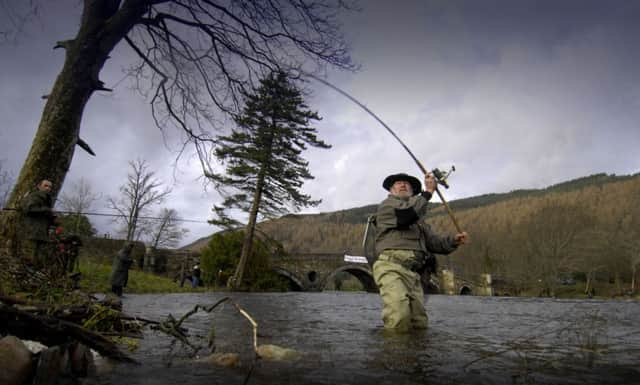We must make more of our prize catch


At A moment when vigorous debate is at the centre of Scottish life, one area on which there can be little divergence of opinion is the magnificence of the country’s natural scenery and wildlife.
This summer has once again seen both domestic and international tourists enjoy the best of what Scotland has to offer in terms of outdoor recreation and country sports. Amongst these pursuits, few present as iconic an image as Scotland’s wild fishing.
Advertisement
Hide AdAdvertisement
Hide AdFrom the Spey to the Tweed and many locations in between, Scotland provides world-class fishing opportunities that delight both fishermen and the rural economies that benefit from the money the sport generates.
It is estimated that game and coarse angling is worth £134m in expenditure to Scottish economy each year – supporting 2,800 jobs across the country – whilst wild Scottish salmon is a premium food product that promotes our food and drink industry internationally and enjoys Protected Geographical Indication (PGI) status. However, more needs to be done to encourage more entrants to the sport.
The traditional image of fishing as an older gentleman’s pursuit – possibly not helped by JR Hartley – needs to be changed. Many fishing boards and trusts have actively encouraged schools and youth groups to pick up a rod and experience the beauty and tranquillity of our rivers and lochs combined with the thrills of a catch but we can go further.
The last two decades has seen a boom in the number of guiding businesses being formed, where novices and irregular anglers can be given expert direction in the sport. Online booking websites for fishing have also revolutionised access to the nation’s beats in a pursuit that would not traditionally be associated with electronic media.
Yet more productive partnerships can still be formed between owners, guides, agencies and tackle companies to promote the sport.
The Scottish Government is also keen that this wonderful industry can be managed in the most effective manner.
Earlier this year, the government announced a Wild fisheries review in order that the sector can be managed, conserved and developed to maximise the benefit of wild fish resources for the country as a whole.
The current system of regional boards and trusts has developed organically and while some catchments are well managed, others are in need of improvement and Scottish Land & Estates has been supportive of this aim.
Advertisement
Hide AdAdvertisement
Hide AdThere remains a need for greater consistency within the new structure, with proposals for fishery management organisations (FMOs) to publish a summary of the year’s work, the plan for coming year, catch records, complaints log, good governance, how the group is managed and annual accounts.
Public meetings and published minutes should also be encouraged to ensure community engagement is achieved.
Many boards already undertake these tasks but they should be encouraged as a standard for the sector.
However, this all needs to happen within organisations that are supported by volunteers. To keep the enthusiasm of local volunteers – and encourage more people to play their part – the government has to ensure that it is not too heavy-handed in its restructuring even if there is a need for Government ministers to have a better “line of sight”, through a body such as Scottish Natural Heritage, to the decisions made by the revised fisheries boards.
One aspect that is vital in any reorganisation is the continued involvement of proprietors in the new fisheries management organisations.
The majority of owners currently offer the right to fish and make considerable investment into their rivers. Their long-term view should be utilised to create a custodial approach to management and proprietors’ involvement can further encourage investment in rivers and deliver a vibrant market for the letting of fishing.
Scottish fishing currently delivers economically, socially and environmentally. The wide availability of fishing means that you can enjoy a great day on a river for less than the cost of a round of golf.
However, there is room for improvement for the future. A careful balancing act is required to ensure the current good work and enthusiasm of the existing fishery board members is not diminished and that areas of weakness are built upon. The panel appointed to conduct the independent review of wild fisheries management in Scotland is due to report to the minister for environment and climate change by the first week of October. In the meantime, the minister himself showed his engagement with the issues by announcing a consultation to implement a statutory catch and release of spring salmon up to 1 April each season.
Advertisement
Hide AdAdvertisement
Hide AdThere is considerable discussion as to whether this goes far enough – but this, and the backdrop of the Review – has certainly galvanised thinking regarding the legacy for future anglers.
With the correct collaboration between government, proprietors and volunteers, the sustainability of Scottish wild fisheries can continue to flourish. Scottish Land & Estates, as with everyone who wants to see our fisheries thrive, will continue to play a full part in supporting this vital sector.
• Katy Dickson is Policy Officer (Business and Property) at Scottish Land & Estates. www.scottishlandandestates.co.uk
SEE ALSO